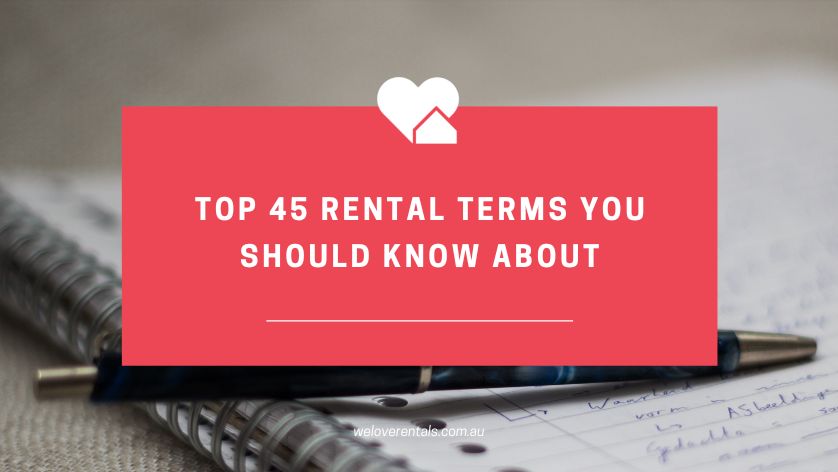
Top 45 Rental Terms You Should Know About
Whether you’re a first time renter, or planning to rent out your first investment property, you may sometimes feel like you need to learn a whole new language! There are a lot of rental terms thrown around in the industry, within contracts and other documents – so it’s important to know the basics.
So Why Do I Need To Understand Real Estate Jargon?
When it comes to renting, there’s a lot of jargon. We can’t cover it all here, but it’s crucial to understand these important rental terms, as they impact your rights and responsibilities as a tenant.
Let’s start with one important place where you’ll find a lot of jargon — the lease.
Understanding your lease
A lease is a legally binding agreement — always know what you’re agreeing to!
Unfamiliar language, both in the lease and discussions about it, can cause confusion. For example, many people are baffled when common expressions like ‘landlord’ are replaced by unfamiliar terms like ‘lessor’.
Signing a lease without understanding isn’t a good idea — it may lead you to unwittingly breach the agreement or forfeit some of your rights!
So before you sign, brush up on what the lease means.
Read on for our guide to rental terms below to clear things up — it’s based on our years of experience, and Department of Mines Industry Regulation and Safety (DMIRS) resources.

The A to Z of Residential Tenancies – rental terms you should know
Additional terms: Conditions added to Residential Tenancy Agreement Form 1AA — these must be consistent with the Residential Tenancies Act (RTA).
Access: owner/property manager’s right to access rented property, in compliance with the RTA.
Assignment: tenants transferring their right to occupancy to others, where permitted by lease/landlord.
Bond: 4 weeks rent, held as security against tenant liabilities when tenancy ends.
Breach: one party breaks the agreement, or doesn’t fulfil a legal requirement e.g. tenants keep unapproved pets, landlords fail to do urgent repairs.
Chattels: movable items provided for tenant use, e.g. pool equipment. Tenants maintain chattels, landlords repair them where necessary (unless tenants are liable).
Co-tenants: unrelated tenants named on a lease.
Days: number of days legally required to give another party notice in a tenancy (varies depending on type of notice/how it is served).
Eviction: removal of tenants from property — only possible by court order, after giving compliant notice.
Fair wear and tear: deterioration to property/chattels due to natural causes, age, or reasonable use — tenants are not held responsible.
Fixed-term agreement: residential tenancy agreement with set end date.
Final Inspection: within 14 days of tenancy ending, a final inspection must be completed and the Property Condition Report (PCR) copied to tenants.
Fittings: attached items, removable without damage, e.g. blinds.
Fixtures: attached items, only removable with damage, e.g. lights.
Guarantor: someone who commits to pay rent if tenants default.
Head tenant: tenant named in lease, when they sublet to a ‘sub-tenant’ — usually only possible with landlord approval.
Joint and several liability: makes all co-tenants individually and jointly responsible for all tenancy liabilities, e.g. rent. Applies in many residential leases.
Landlord: Lessor, or the person leasing the property.
Lease: Residential Tenancy Agreement outlining terms of tenancy, such as length and agreed occupants.
Lessor: Landlord.
Maintenance: preventative work.
Mortgagee: lender with legal rights over property.
Notice: formal legal document served by either party, to advise of significant matters (e.g. breach, termination)
Option fee: charged to the applicant while tenancy application is considered, usually capped at $50-$100 (depending on rent).
Periodic tenancy: tenancy with no fixed end date.
Pet bond: additional $260 held where pets are approved.
Premises: rented property.
Prescribed form: forms the RTA makes mandatory, including:
- Residential Tenancy Agreement (Form 1AA)
- Information for Tenant — (Form 1AC)
- Notices of Termination — (Forms 2, 1A, 1B, 1C)
Property: rented buildings, land and strata common property.
Property Condition Report (PCR): report on condition of buildings, contents, gardens, mandatory within 7 days of tenancy starting. Form 1 prescribes content.
Utilities: gas, electricity, water.
Quiet enjoyment: tenants’ right to occupy property without unreasonable intrusion.
Routine repairs: non-urgent but necessary repairs — landlords must complete within reasonable time, unless tenants are liable.
Routine Inspection: conducted up to 4 times in any year, in compliance with RTA access rules.
Residential Tenancy Agreement (lease): agreed terms and conditions for renting property — Form 1AA is prescribed.
Residential Tenancy Database: subscription database agents use to check applicants’ tenancy history.
Security bond: See Bond.
Strata Terms:
- Common property: areas available to all strata residents.
- Strata Body Corporate: body representing strata lot owners.
- Strata Manager: person/company paid to administer a strata scheme.
- Strata By-Laws: regulations re pets, parking etc. — must be included in lease.
Sub-let/Sub-tenant: see Head Tenant.
Tenant: lessee/person(s) renting property.
Termination: ending tenancy by mutual agreement, under RTA provisions or by court order.
Urgent Repairs: repairs defined by the RTA as urgent — these must be arranged within 24 or 48 hours depending on the type of repair.
So what should I do now?
NOTE: We aren’t able to include every relevant term in this list. For further information, please consult an experienced property manager or further DMIRS resources for landlords and tenants online.
Always read documents carefully before signing, and ask your property manager if any terminology they are using isn’t making sense!
At We Love Rentals we pride ourselves on helping owners and tenants understand their rights and responsibilities – feel free to contact our friendly team on (08) 6254 6300 or via our website if you have any questions about rental terms.

